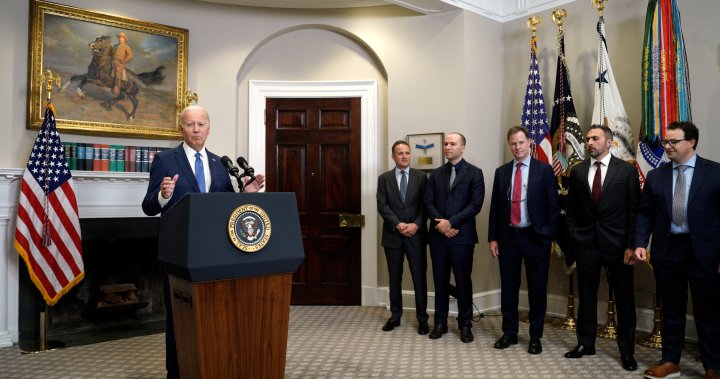
Amazon, Google, Meta, Microsoft agree to AI safeguards set by White House
Global News
``We must be clear-eyed and vigilant about the threats emerging technologies can pose,'' U.S. President Joe Biden said. ``These commitments are a promising step."
President Joe Biden said Friday that new commitments by Amazon, Google, Meta, Microsoft and other companies that are leading the development of artificial intelligence technology to meet a set of AI safeguards brokered by his White House are an important step toward managing the “enormous” promise and risks posed by the technology.
Biden announced that his administration has secured voluntary commitments from seven U.S. companies meant to ensure that their AI products are safe before they release them. Some of the commitments call for third-party oversight of the workings of the next generation of AI systems, though they don’t detail who will audit the technology or hold the companies accountable.
“We must be clear-eyed and vigilant about the threats emerging technologies can pose,” Biden said, adding that the companies have a “fundamental obligation” to ensure their products are safe.
“Social media has shown us the harm that powerful technology can do without the right safeguards in place,” Biden added. “These commitments are a promising step, but we have a lot more work to do together.”
A surge of commercial investment in generative AI tools that can write convincingly human-like text and churn out new images and other media has brought public fascination as well as concern about their ability to trick people and spread disinformation, among other dangers.
The four tech giants, along with ChatGPT-maker OpenAI and startups Anthropic and Inflection, have committed to security testing “carried out in part by independent experts” to guard against major risks, such as to biosecurity and cybersecurity, the White House said in a statement.
That testing will also examine the potential for societal harms, such as bias and discrimination, and more theoretical dangers about advanced AI systems that could gain control of physical systems or “self-replicate” by making copies of themselves.
The companies have also committed to methods for reporting vulnerabilities to their systems and to using digital watermarking to help distinguish between real and AI-generated images or audio known as deepfakes.

 Run 3 Space | Play Space Running Game
Run 3 Space | Play Space Running Game Traffic Jam 3D | Online Racing Game
Traffic Jam 3D | Online Racing Game Duck Hunt | Play Old Classic Game
Duck Hunt | Play Old Classic Game